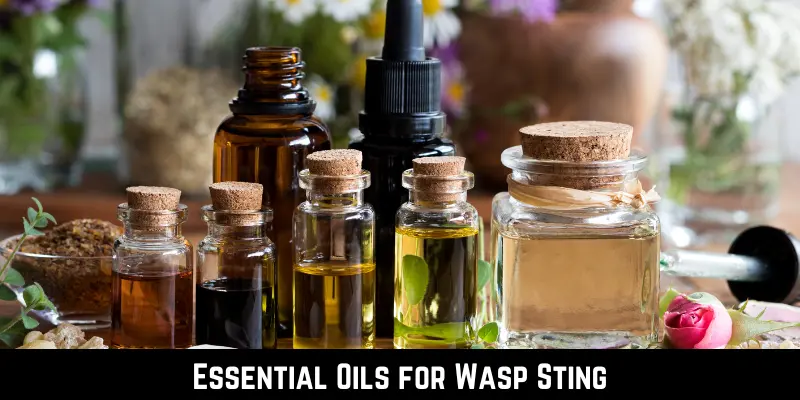During the sunny months, when we enjoy the outdoors, we might see more bugs like wasps. This means there’s a higher chance we could get stung. Have you thought of using Essential oils for a wasp sting?
In the world of natural health, essential oils are known to help with many problems, including stings from wasps. Essential oils can help lessen the pain, swelling, and itching from a wasp sting. Also, these oils can stop infections because they kill germs. However, it’s very important to know the right way to use these oils and whether they might cause any allergic reactions or side effects.
This article will explain the science and people’s experiences with using essential oils for these stings. If you want to know how these natural oils can provide relief, keep reading and learn about their soothing properties!
Why Do Wasps Sting?

Wasps mostly sting when they feel they need to defend themselves. Many people need to learn about these bugs. Even though they might look scary and ready to attack, they usually sting only when necessary.
Like any other animal, wasps want to keep themselves and their families safe. The stinger of a wasp, especially for the female ones, is like a tool to lay eggs, but they can also use it to defend themselves when scared.
The stuff they inject when they sting can hurt, and it tells other animals to stay away because wasps aren’t easy to eat. Wasps also like to protect their area, especially near their nests. So if someone or something gets too close, the wasps might get more protective.
Symptoms of a Wasp Sting
According to Clinical Kidney Journal, Volume 15, Issue 2, the following are the symptoms of wasp sting
- Pain: When a wasp stings you, it hurts right away at the spot where you got stung.
- Red Skin: The area around the sting will turn red, showing that it’s starting to swell.
- Swelling: You’ll notice a bump form where the wasp stung you, as your body sends fluids and cells to that spot.
- Itching: The sting area will feel really itchy, almost like you’re being poked by lots of tiny needles.
- Warm Feeling: The skin around the sting will feel warm as if it’s being heated from underneath.
- Severe Allergic Reaction: Some people can have a serious reaction to a sting. Signs include trouble breathing, full-body hives, and a sudden drop in blood pressure.
- Feeling Anxious or Irritable: You might feel nervous or even a bit cranky because your body releases stress hormones.
- Other Allergic Signs: In extreme cases, you might feel stomach upset or a strange metallic taste in your mouth.
Immediate First Aid Measures

- Use tweezers or a flat object like a credit card to scrape off the stinger, if it’s still there. Don’t squeeze it out.
- Put a cold pack or ice wrapped in a cloth on the area to reduce swelling and numb the pain.
- Allergy medicines can help lessen itching and other symptoms.
- Pain relievers like ibuprofen can help with pain and swelling.
- If you know you have severe allergies to wasp stings, use an epinephrine auto-injector immediately and keep one handy.
- If you start showing signs of a severe allergic reaction, get to a hospital or call emergency services as fast as possible.
- Try to stay calm. Soothing words and gentle touches from others can help you feel better emotionally.
- Sip some water and try to relax. This helps your body fight off the effects of the sting and helps you recover faster.
The Magic of Essential Oils
Essential oils are like nature captured in a small bottle. They come from plants and have a strong and wonderful smell. These oils are not just about their scent; they have been used for a long time and combine old traditions with new knowledge.
If we look closely, every essential oil is made of many parts, each with its own story. For example, lavender oil helps us feel relaxed and calm. It’s like a gentle song that makes our brain feel at peace. Peppermint oil gives us a boost of energy and helps wake us up when we’re tired.
These oils remind us of stories from nature. When you smell the deep scent of frankincense, it might make you think of old traditions. And ylang-ylang might remind you of faraway places with beautiful flowers.
In today’s world, where many things are man-made, essential oils give us a real feel of nature. When you smell the fresh scent of pine, it’s like being in a forest. Or the salty smell of seaweed might make you think of the sea. Using these oils can give us a short break from busy city life.
How Essential Oils Work?
According to the Journal of Economic Entomology, essential oils work with our sense of smell. When we breathe them in, their scent particles touch parts of our noses.
- These parts send messages to our brain, especially the areas linked to feelings and memories.
- When we put these oils on our skin, they can have helpful effects right where we apply them. Our skin lets some parts of the oils go into our blood so they can work their magic inside our body, too.
- These oils have special parts that can fight off bacteria or reduce swelling. They help our bodies in different ways.
- Because they help us relax, essential oils can lower the stress hormone in our bodies.
- These oils can also make the air smell fresh and clean because they spread quickly.
Benefits of Essential Oils For Insect Bites and Stings
- Less Swelling: Oils like lavender and chamomile lower puffiness and redness from bug bites.
- Pain Relief: Eucalyptus and peppermint oils help to ease pain by making the spot feel numb.
- Clean and Safe: Tea tree oil cleans the bite area, ensuring bad germs stay away.
- Calming: Oils like calendula and lavender soothe the skin, helping with itchiness and making healing faster.
- Removing Bad Stuff: Oils like helichrysum help take out harmful things that some bug venom has.
- Keep Bugs Away: Some oils, like citronella and lemongrass, keep bugs from biting us in the first place.
- Boost Our Body’s Defense: Oils like frankincense and oregano strengthen our body’s defense system. This helps our body fight off any bad effects from bug bites faster.
- Fewer Scars: Oils with many healthy parts, like rosehip or carrot seed, can help the skin heal without leaving scars after bed bug bites.”
Top Essential Oils for Wasp Stings
Lavender Oil
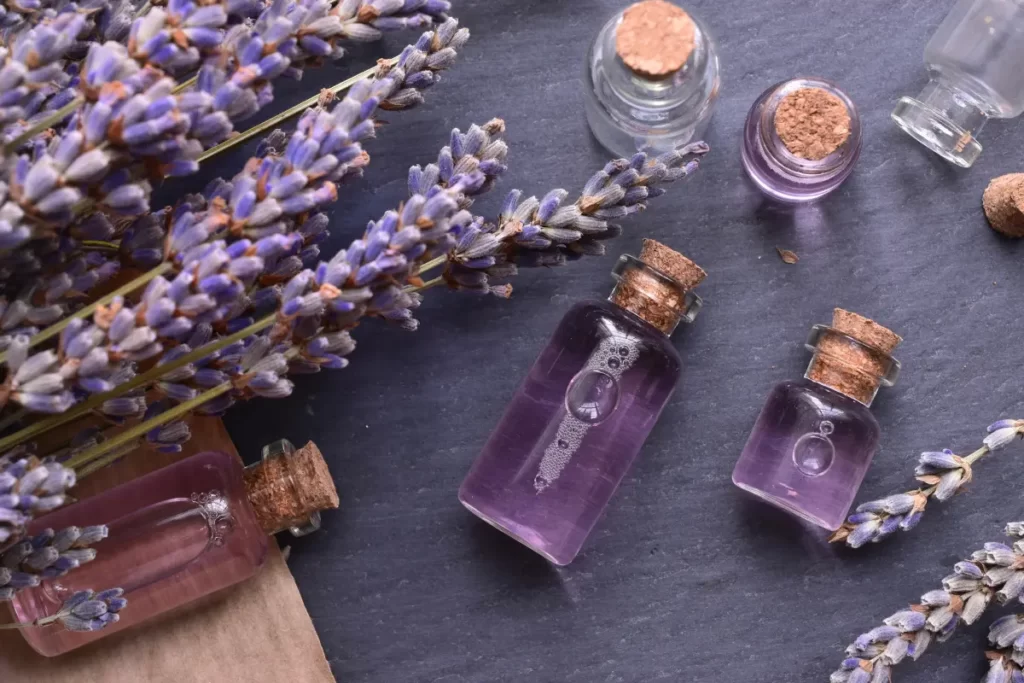
Nature offers many remedies, and Lavender oil is one of the best. It has a lovely smell that reminds you of peaceful fields. But more than its smell, it’s known for its strong healing power. Imagine enjoying a sunny day and suddenly getting a painful wasp sting. Think of the calming lavender fields – that’s the comfort this oil provides.
Long ago, even ancient kings in Egypt and nobles in Europe loved lavender. It does more than calm you down. For wasp stings, think of lavender oil as a gentle, comforting voice when you’re in pain. It helps reduce swelling and lessen the sharp sting pain.
Plus, it has natural ingredients that prevent allergic reactions, ensuring the sting doesn’t become a bigger problem. When a wasp sting feels overwhelming, Lavender oil acts like a gentle song, making everything feel peaceful again.
Tea Tree Oil
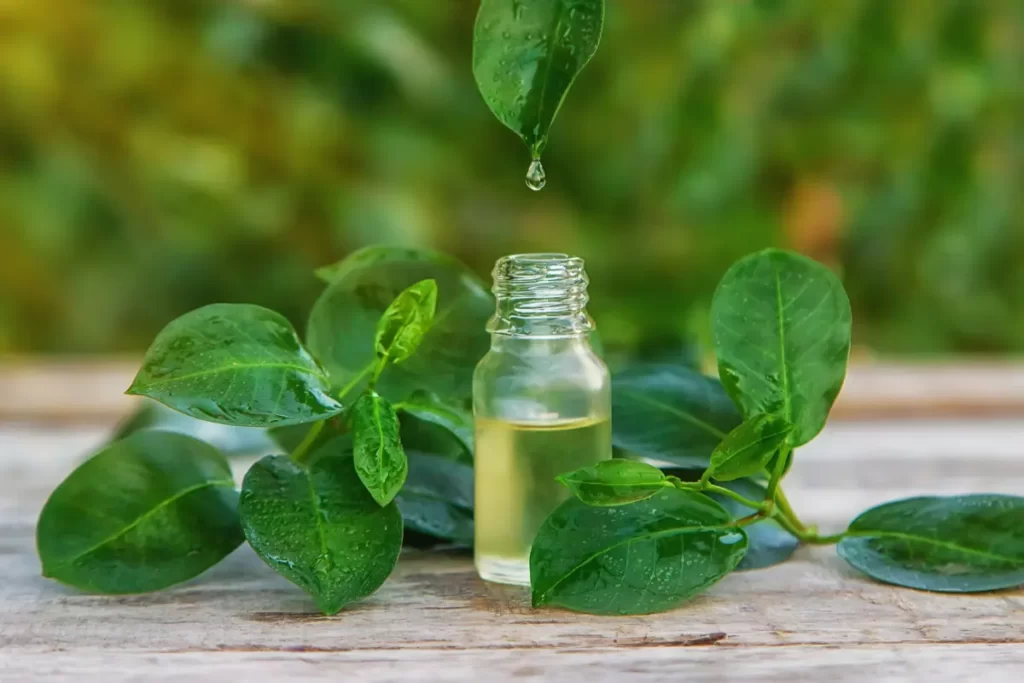
Tea Tree oil comes from wild parts of Australia, known for its strong nature. But this oil is all about protection and healing. The first people of Australia, the Aboriginals, have trusted this oil for a long time, using it for many health problems.
If a wasp stings and injects its venom, causing pain and swelling, Tea Tree oil is a strong helper. It can prevent infections, which is important since wasps live in different places.
This oil also helps reduce redness and itching, just like some creams you find in stores. The unique smell of Tea Tree oil is powerful and refreshing. It’s like a protector, guarding your skin and helping it heal after a wasp attack.
Lemongrass
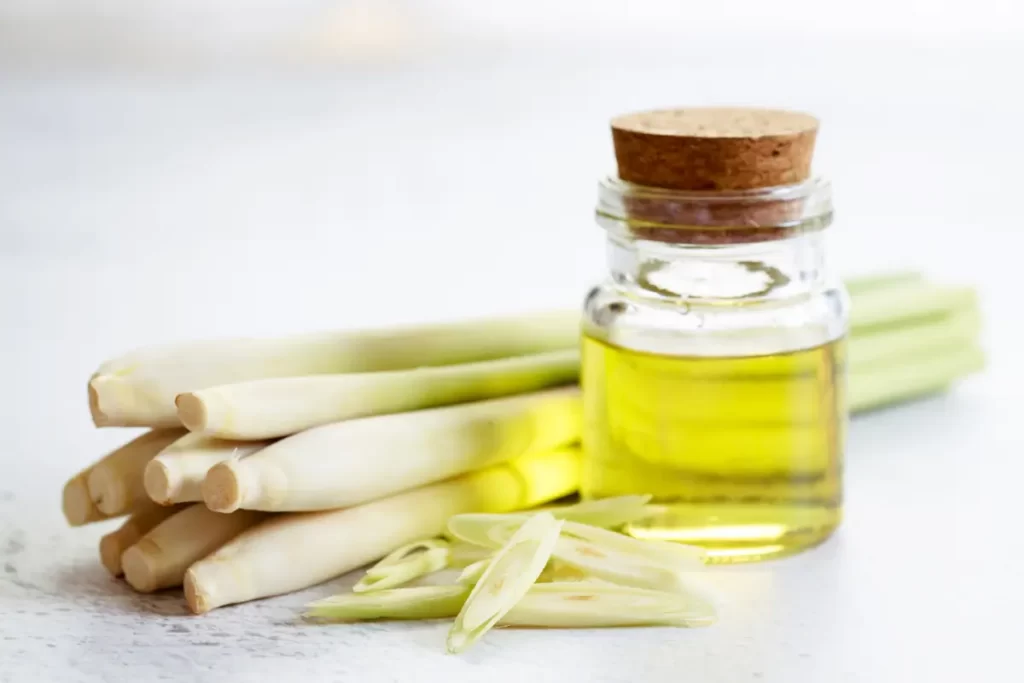
Nature has many ways to help us, and Lemongrass is one of them. When you think of lemongrass, picture warm evenings in places like Asia, but it’s more than just a nice smell. It’s a big help when a wasp stings you.
Lemongrass is more than just something to flavor our food. It’s packed with things that help heal. When a wasp stings, it hurts a lot. But lemongrass has something called citral in it. This helps to reduce the pain and swelling from the sting, like turning down a loud radio. It also stops bad germs, so the sting doesn’t get infected.
But lemongrass does more. Its lovely smell makes us feel better. It takes us to a sunny field where everything is calm and peaceful. So, it doesn’t just treat the sting; it helps us feel better, too.
Frankincense
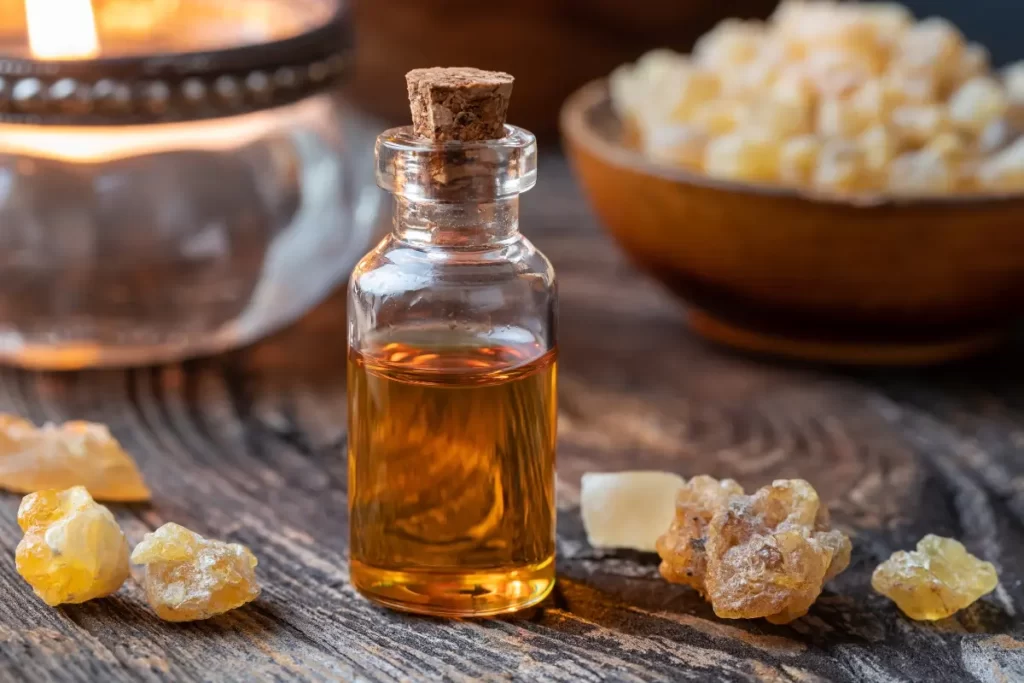
People have known about Frankincense for a very long time. It comes from the Boswellia tree, which grows in dry places like the Middle East. This old tree sap has a special way of helping with wasp stings.
When you use frankincense on a wasp sting, it acts like a wise old friend. It calms down the red, swollen skin. It’s like the oil talks to your body, reminding it to be calm. It also keeps the sting clean, guarding it like a watchful protector.
But there’s another gift from frankincense. It has a deep, calming smell. If a wasp sting surprises or scares you, this smell helps you feel peaceful. It makes you think of quiet deserts under a starry sky.
Citronella
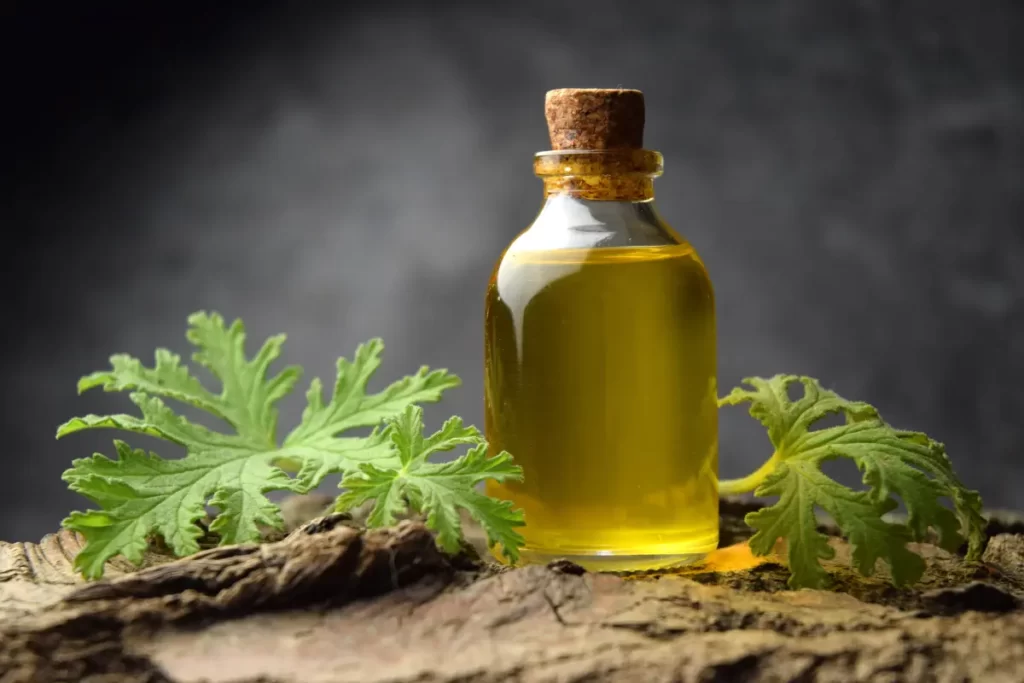
From sunny places with tall grasses, we get Citronella. It’s like a bright light that helps against wasp stings. People often use it during summer to keep bugs away, but it does more than that. This oil, which smells a bit like lemon, has been used for a long time.
When you use citronella oil on a wasp sting, it’s like pouring sunlight on it. This oil helps because it reduces swelling and pain, much like a hero coming to save the day. It also keeps the sting clean, ensuring no bad germs can cause an infection.
The best part about Citronella? Its smell. It makes you think of sunny days and green fields. This nice smell helps you forget about the pain and feel better.
Patchouli
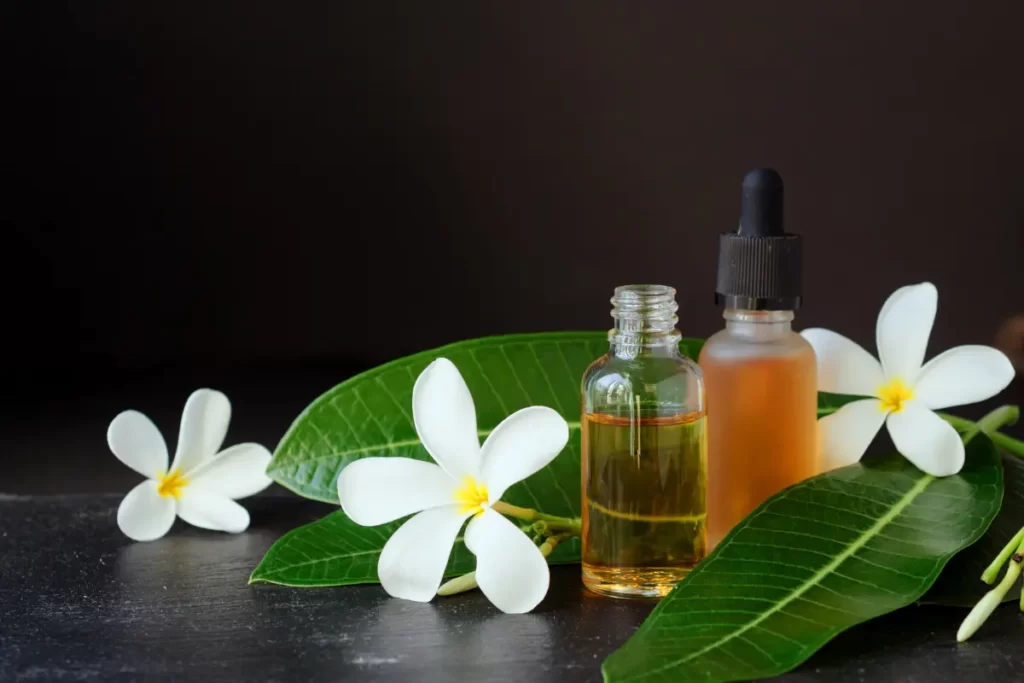
From old forests in Asia, Patchouli is like a guardian for our skin, especially after a wasp sting. Some think of it as an old-fashioned oil, but it helps sore skin. When you put Patchouli on a sting, it goes deep to help. It reduces redness and pain. It’s like a wise friend telling your skin to calm down. This oil also keeps the sting clean and free from bad germs.
But what many people remember about Patchouli is its unique smell. It’s a deep, earthy scent. It reminds you of old forests and the calm feeling of being connected to the earth. This comforting smell helps you relax and feel better after the shock of a sting.
Ylang Ylang
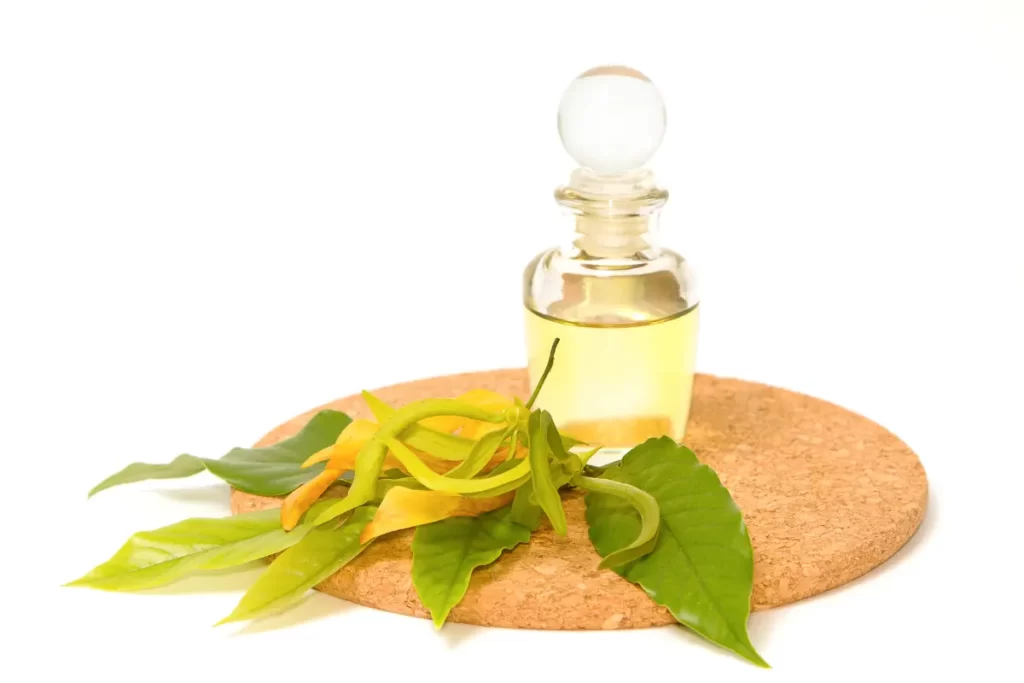
Ylang Ylang comes from beautiful, sunny tropical places. It’s not just a nice smell; it’s like a helper for people stung by wasps. When you use Ylang Ylang oil, the sting gets a calming hug from a tropical breeze.
The oil helps calm the swelling and pain, almost like a gentle song that makes a crying child feel better. Plus, it helps keep the sting clean, so no bad germs can worsen it. What’s special about Ylang Ylang is its smell. It’s sweet and flowery. Breathing it in makes you feel better and think of beautiful islands with stories of long ago.
Peppermint Oil
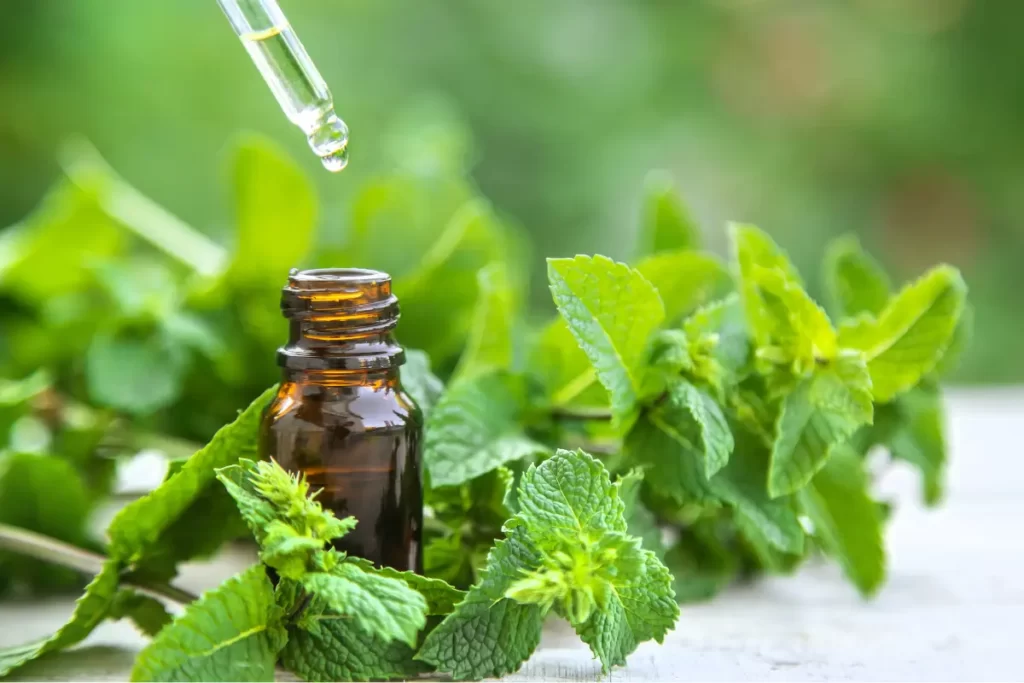
Peppermint Oil comes from green fields where the air is cool and fresh. It’s like a strong wind that stands up to the heat of a wasp sting. When you put peppermint oil on a sting, it feels cold and comforting. The menthol in the oil does two things: it helps reduce the swelling and it makes the pain quieter. Plus, it keeps the sting clean, so no infections can start.
But there’s more to peppermint oil than just helping with stings. Its fresh and cool smell makes you think of green fields in the morning. It makes both your body and your heart feel better.
Chamomile Oil
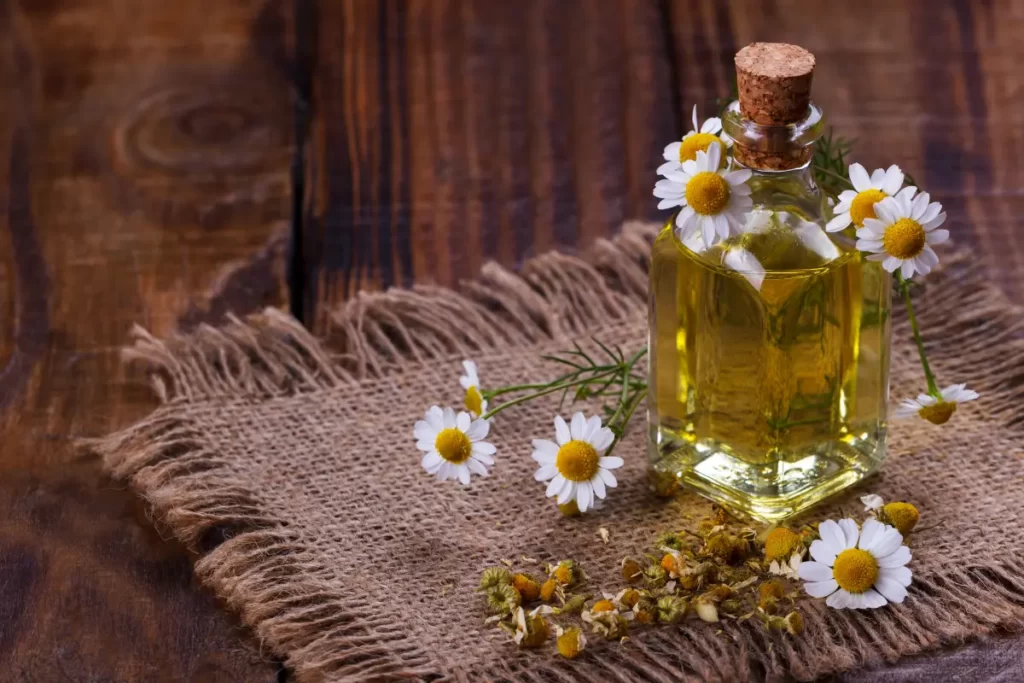
In fields where flowers look up to the night sky, Chamomile grows, known for its calming touch. Many know it from tea, but as an oil, it’s great for skin stings from wasps.
Chamomile oil, with its special ingredient azulene, acts like a caring friend. It soothes the red, sore spot from the sting, making it feel better slowly and gently. This oil also keeps the sting clean, ensuring no bad germs can cause more trouble. And its lovely smell? It’s like a soft hug, reminding you of peaceful fields under the moon and stars, helping you feel calm inside and out.
Basil
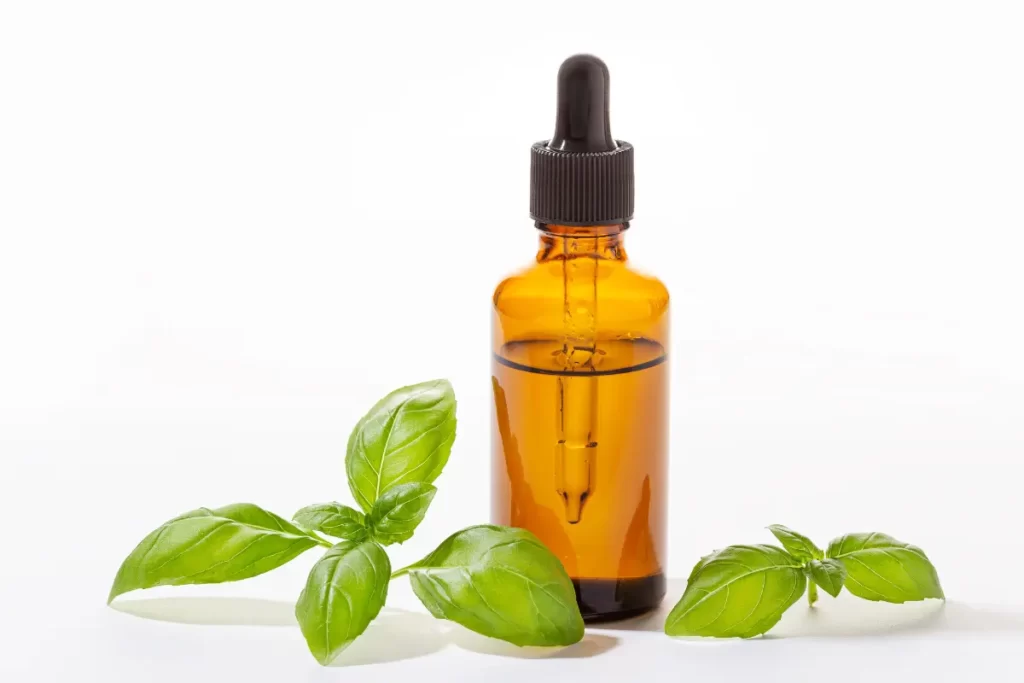
Basil grows tall and proud in sunny gardens filled with basil and herbs. We use it in food, but when made into an oil, it’s a strong helper for wasp stings.
Basil oil, packed with something called eugenol, works right on the sting. It’s like an old remedy coming to life, calming the sharp pain and making the redness go down. It also keeps the sting clean so that no infections can start.
But there’s more to Basil than just healing. Its strong, green smell tells a story. It reminds us of old gardens, stories shared in the shade, and nature’s old ways of healing that have been passed down for years.
Rosemary
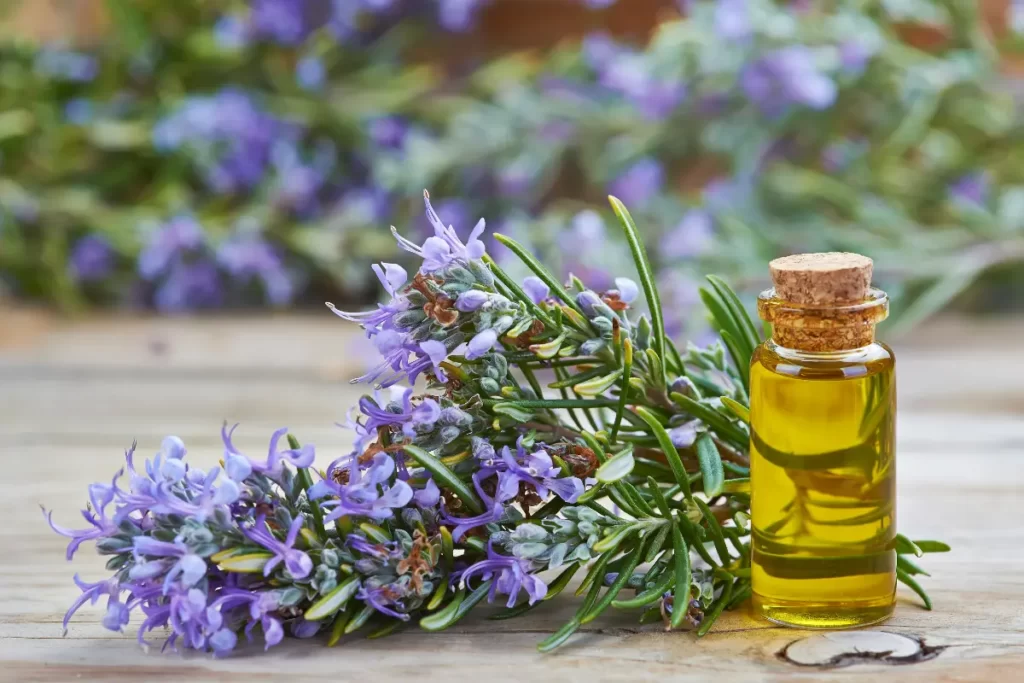
In deep, old forests where the wind tells stories, Rosemary stands tall like a wise storyteller. This herb, known for its thin leaves, isn’t just for cooking. When turned into oil, it’s really good for treating wasp stings.
Rosemary oil, with ingredients like camphor and pinene, knows how to help a sting. It soothes the sting, helping the skin feel cooler and less painful. It’s like the oil is telling the hurt skin to relax and feel better.
It also helps keep the sting clean so that no bad bugs can worsen it. But Rosemary is more than just a healer. Its smell, a mix of forest and fresh air takes your mind on a trip, like walking through old woods filled with magic and stories. It’s more than just medicine; it’s like a journey back in time.
Eucalyptus
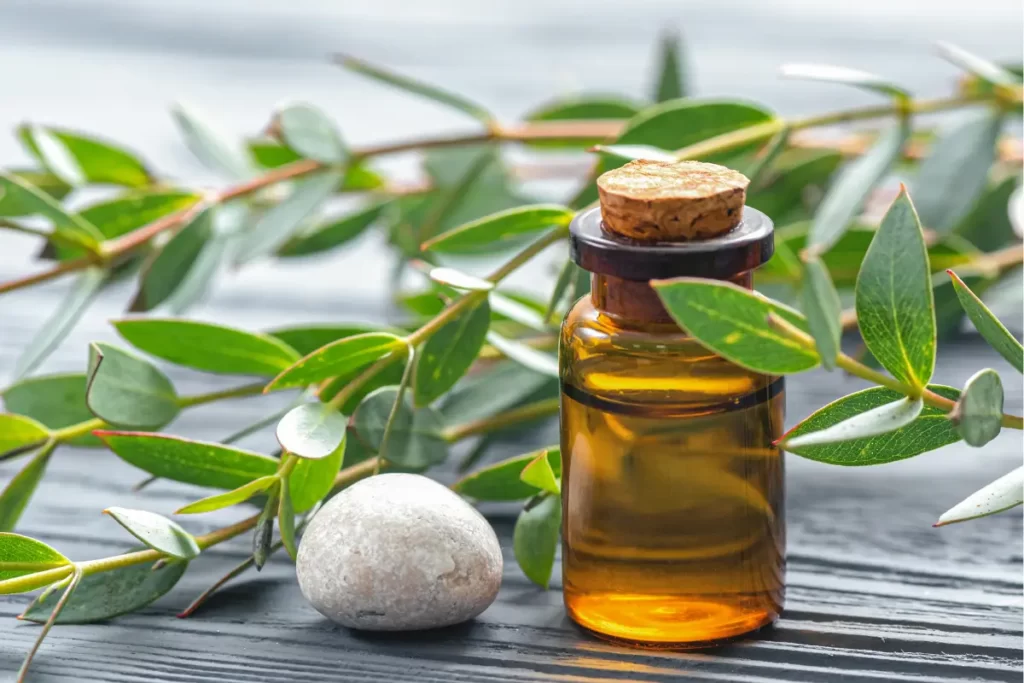
High up in misty mountains where big trees touch the clouds, Eucalyptus stands tall and proud. When turned into oil, this big tree is great at dealing with the hurt from a wasp sting.
Eucalyptus oil, packed with something called cineole, quickly helps a sting. As soon as it’s put on, you feel a cool relief. It helps stop the pain and reduces the swelling. Plus, it keeps the sting clean so that it can heal nicely.
But Eucalyptus is more than just a helper. Its strong, fresh smell makes you think of tall mountains, old forests, and fresh morning air. It gives you a feeling of fresh start and newness, even when dealing with the pain of a sting.
Application Methods
Direct Application
Essential oils like lavender or tea tree can help with wasp stings by cleaning the area and reducing swelling. But be careful, using them directly can sometimes cause problems.
Remove the stinger from the sting area first. Wash the area with soap and water to get rid of germs. Use a dropper or cotton swab to put a small amount of essential oil on the sting.
It might tingle or even burn a little when you first put the oil on the wasp sting. This is good for people who know their skin well and aren’t allergic to essential oils. If you’re not sure, try putting a small amount on another part of your skin first to see if you react badly.
Dilution with a Carrier Oil
If putting essential oils directly on your skin sounds too strong. You can mix them with another oil like coconut or jojoba. This makes the essential oil less intense but still effective. Mix 3 to 5 drops of essential oil with one ounce of another oil like coconut or jojoba. Gently rub the mix onto the area where you were stung.
This is a good choice for people with sensitive skin or who haven’t used essential oils. It’s less likely to irritate your skin. Always talk to a healthcare provider if you have concerns or are dealing with a severe allergic reaction to a wasp sting.
| Essential Oil | Direct Application | Dilution with a Carrier Oil |
| Lavender Oil | Not Recommended | Recommended |
| Tea Tree Oil | Not Recommended | Recommended |
| Lemongrass Oil | Not Recommended | Recommended |
| Frankincense Oil | Not Recommended | Recommended |
| Citronella Oil | Not Recommended | Recommended |
| Patchouli Oil | Not Recommended | Recommended |
| Ylang Ylang Oil | Not Recommended | Recommended |
| Peppermint Oil | Not Recommended | Recommended |
| Chamomile Oil | Not Recommended | Recommended |
| Basil Oil | Not Recommended | Recommended |
| Rosemary Oil | Not Recommended | Recommended |
| Eucalyptus Oil | Not Recommended | Recommended |
Precautions and Side Effects
| Tea Tree Oil | Avoid ingestion and contact with eyes. | Skin irritation, redness, itching, and dryness. | |
| Lemongrass Oil | Avoid during pregnancy and in case of liver problems. | Skin irritation, and increased sensitivity to sunlight. | |
| Frankincense Oil | Avoid during pregnancy. Avoid if you have blood clotting issues. | Skin irritation, rash, and gastrointestinal distress. | |
| Citronella Oil | Avoid during pregnancy and if allergic to grasses. | Skin irritation, increased sensitivity to sunlight, allergies. | |
| Patchouli Oil | Avoid during pregnancy. Avoid in cases of appetite loss. | Skin irritation, drowsiness, and appetite loss. | |
| Ylang Ylang Oil | Avoid during pregnancy. Avoid if you have low blood pressure. | Skin irritation, headache, nausea. | |
| Peppermint Oil | Avoid during pregnancy. Avoid if you have G6PD deficiency. | Skin irritation, heartburn, and allergic reactions. | |
| Chamomile Oil | Avoid during pregnancy. Avoid if allergic to ragweed. | Skin irritation, allergic reactions. | |
| Basil Oil | Avoid during pregnancy. Avoid in case of liver problems. | Skin irritation, nausea, and dizziness. | |
| Rosemary Oil | Avoid during pregnancy. Avoid if you have epilepsy or high blood pressure. | Skin irritation, allergic reactions, nausea. | |
| Eucalyptus Oil | Avoid during pregnancy. Avoid if you have epilepsy. | Skin irritation, nausea, dizziness, seizures. |
Conclusion
Essential oils are like little bottles of plant power. If a wasp stung you, they can help you feel better. You can use them in different ways, either strong and direct or mixed and gentle, depending on what your skin can handle. Oils are good for cleaning the sting area and reducing swelling. They’re like helpers for your body’s defense system, fighting off germs and calming irritation.
Essential oils are strong, so you have to be careful. Too much can be overwhelming, but just the right amount can be very helpful. Always check with a healthcare provider if you’re unsure or if the sting is causing a severe reaction.
FAQs
S O Oladipupo, X P Hu, A G Appel, Essential Oils in Urban Insect Management—A Review, Journal of Economic Entomology, Volume 115, Issue 5, October 2022, Pages 1375–1408
